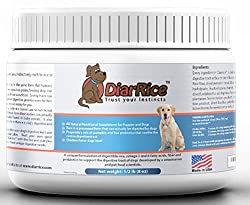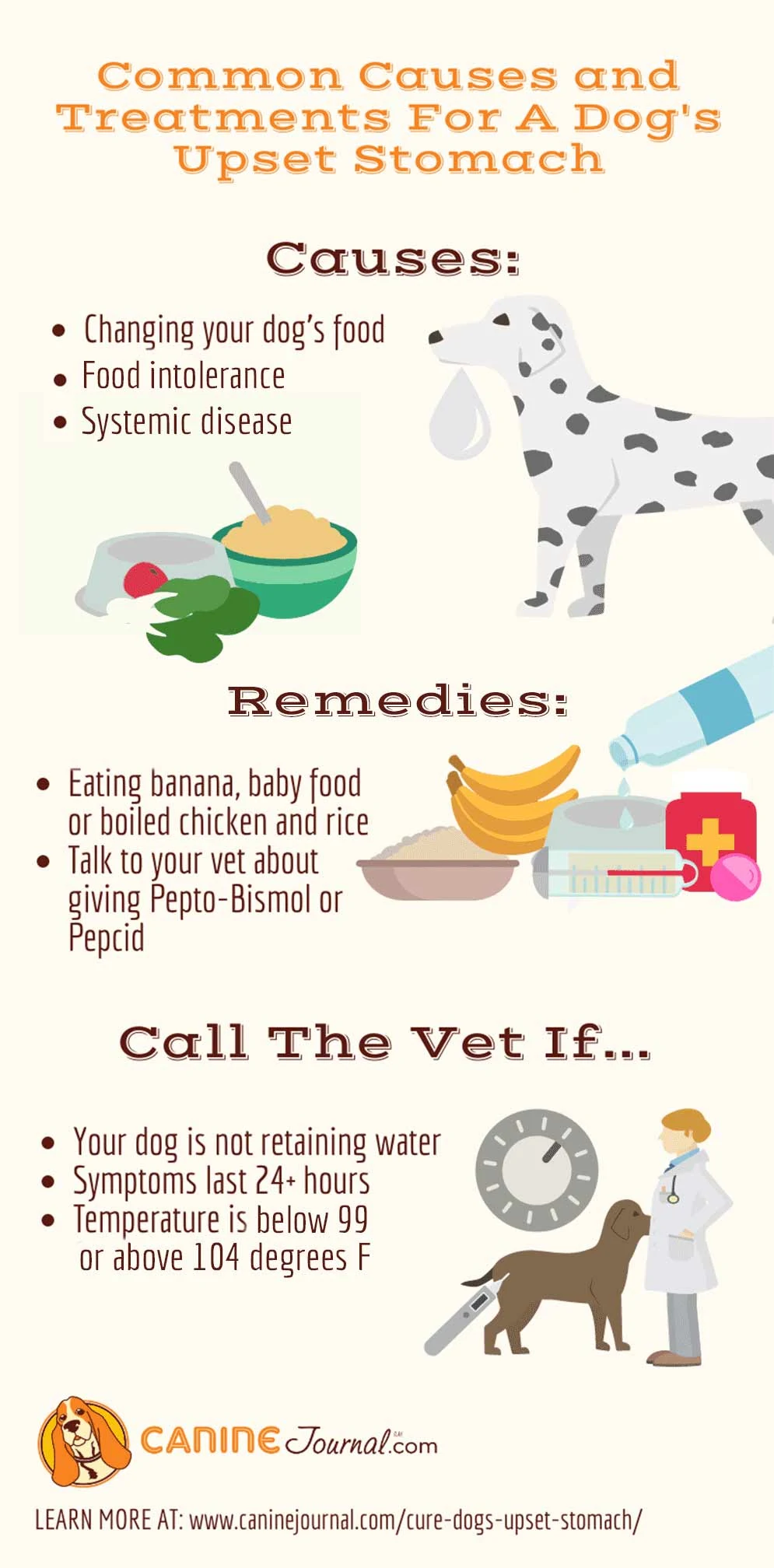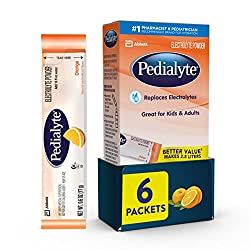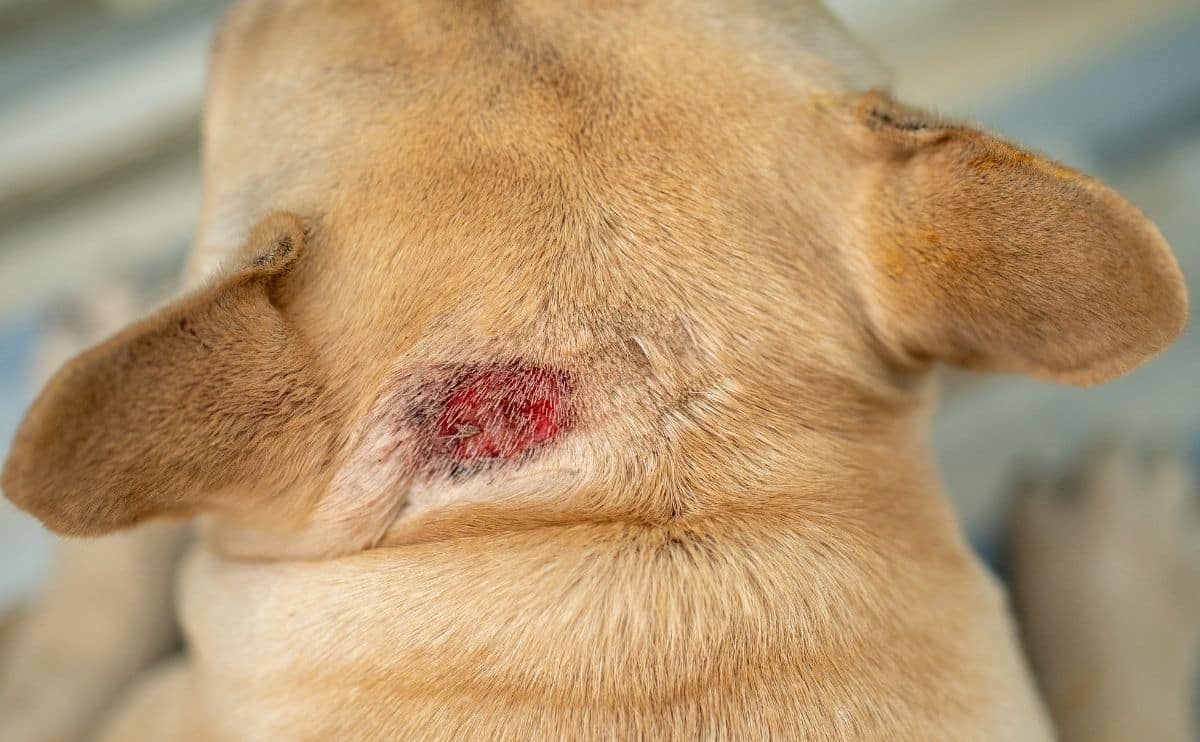What To Give A Dog For Upset Stomach: Remedies To Settle A Sick Tummy
When you purchase through links on our site, we may earn a commission. Here’s how it works.

Does your dog have an upset stomach? Dogs normally eat grass to clean out their system. This is a natural method of soothing your dog’s sick tummy. However, this won’t always do the trick. In fact, your dog may not even feel like eating grass. I’ve got some additional tips to share to help cure your dog’s upset tummy. I also cover some common causes of an upset stomach in dogs and when it’s time to call the vet.
Table of Contents
From The Veterinarian
Because dogs having upset stomachs are so common, I sat down with Dr. Rebecca MacMillan, MRCVS, to get a veterinarian’s perspective on this very common pet problem. Dr. MacMillan is a small animal veterinarian and surgeon. Here’s what she had to say.
“Symptoms vary depending on severity, but most dogs pass soft or liquid stools when they have a sick stomach. They usually need to defecate more often than usual and might be straining a bit, too. Other signs include flatulence, inappetence, and lethargy. Most cases of upset stomachs involve a short bout of diarrhea that resolves with minimal treatment, though your dog might feel a bit off-color at the time. Most days, repeated bouts of diarrhea or a dog with loose stool indicate a chronic condition that needs investigation. Left untreated, your dog could suffer from malnutrition and weight loss,” Dr. Rebecca MacMillan.
Dr. MacMillan goes on, “Depending on the findings of your veterinarian’s examination, they might suggest a blood test. Tests may indicate dehydration and show electrolyte imbalances. More specific blood tests can look at your dog’s pancreatic enzymes to screen for pancreatitis or an underactive pancreas (Pancreatic Insufficiency). Your vet can also assess your dog’s protein and vitamin levels for deficiencies.”
“Infectious causes of diarrhea, such as bacterial infections or parasites, are usually diagnosed from fecal samples. Your vet can also assess feces for signs of blood loss. X-rays or ultrasound scans may be helpful to rule out obstructions in your dog’s digestive tract and to look for signs of cancer or liver issues. Surgical biopsies of your dog’s digestive tract are sometimes required for a definitive determination of some causes of diarrhea,” said Dr. Rebecca MacMillan.
What Are Some Common Symptoms Of A Dog’s Upset Stomach?
If your dog is experiencing any of these symptoms or unusual behaviors, they may suffer from an upset stomach.
- Appetite loss
- Diarrhea
- Floor licking
- Flatulence
- Grass eating
- Gurgling stomach noises
- Salivation
- Vomiting
Home Remedy vs Vet Consultation
Often, you can treat your dog at home for an infrequent sick stomach. However, if they have repeated incidents or experience any more serious symptoms, we recommend that you take your dog to a veterinarian immediately.
Symptoms That Require A Vet Visit
- Anxious pacing
- Abdominal pain
- Bloody stool
- Continuous vomiting
- Dehydration
- Distended stomach
- Dry vomiting (nothing coming out)
- Fever
- Lethargy
- Ongoing diarrhea
- Uncontrollable drooling
- Weight loss
These symptoms could point towards a more severe condition requiring immediate veterinary attention. Blood in your dog’s stool, vomiting blood, persistent vomiting or diarrhea for longer than 24 hours, refusal to eat or drink, lethargy, and severe pain are all signs your dog needs medical attention quickly.
Even if your dog has only mild stomach upset, always talk with your vet before trying any home remedies.
What Causes Dogs To Get An Upset Stomach?
In addition to discomfort and possible stomach pain, an upset stomach may also be a symptom of an underlying issue. Your dog may have something as mild as the flu or as life-threatening as the parvovirus. If your dog has a bacterial infection or a virus, they are likely to show other signs along with an upset stomach. Should the condition persist, the most dangerous threat is likely dehydration.
You might be curious to know what caused the upset stomach to begin with. The causes of an upset stomach in dogs could stretch a mile long. I explain a few common causes below.
Changing Your Dog’s Food
Although dogs will eat almost anything you put in front of them, their stomachs don’t always agree with this free-for-all type of consumption. One of the most likely causes of an upset stomach is a change in diet. Something as simple as a change in brand or flavor of dog food can upset a dog’s tummy. Also, making that shift too quickly can cause upset because the digestive system needs time to adjust to diet changes.
So, make sure you still have some of your dog’s current food to allow time for the transition. For about a week, slowly start mixing in more and more of the new food into less and less of the current food until the shift is complete.
Read our articles on changing dog food and transitioning your puppy to adult dog food for more specific details. Go slow and keep an eye on your dog while changing food to ensure their health. Make sure your dog doesn’t eat too fast (even if they absolutely love the new food), as that can also cause an upset tummy. Consult your vet if you have any questions during this process or run into any health concerns.
If you haven’t changed your dog’s diet, you might start searching for another reason.
Dietary Indiscretion
This means eating something that he shouldn’t have, which often leads to a condition called “garbage gut.” Dogs may do this when out on walks, so it can be hard to avoid altogether, especially when they’re sniffing around or off-leash. Try to discourage this behavior where possible, as many things found on the ground have gone bad and contain high levels of bacteria.
It’s also worth noting that feeding your dog table scraps or changing their regular diet suddenly could create tummy upset, too. In some cases, an upset tummy can be because of eating poop or trash, so be sure to keep your home and yard tidy. And be sure your trash can always remains securely closed.
Inflammatory Bowel Disease
Inflammatory bowel disease (IBD) is an underlying condition that causes inflammation in the digestive system and intestines. The inflammation interferes with digestion and damages the stomach lining. Dogs with IBS have an excessive growth of inflammatory cells. Symptoms include chronic diarrhea, chronic vomiting, stomach pain, low appetite, weight loss, and more.
We do not yet understand the cause of IBD, but many veterinarians believe it is a response to another medical condition. These can include bacteria, parasites, food allergies, a genetic marker, or a weakened immune system. In some cases, your vet may put your dog on a special hydrolyzed diet, which is easier to digest and can help narrow down the cause of discomfort.
Due to similar symptoms, IBD can often be confused with irritable bowel syndrome (IBS). IBS is a condition that largely affects the large intestine. It is often caused by infection, stress, and diet changes. Both can cause intense pain and disruptions to your dog’s digestive system.
Parasites
If your dog has a large number of worms in his digestive tract, then this could cause diarrhea. Other parasites include the microscopic protozoan Giardia, which can cause loose stools and be infectious between pets. If you notice your dog scooting across the ground to wipe its butt, they should be tested for worms.
Bacteria
Salmonella, campylobacter, and E.coli can cause diarrhea in some animals. Animals on raw food diets are at higher risk of encountering these bacteria.
Virus
The most well-known viral cause of diarrhea is parvovirus. Affected animals usually pass large amounts of bloody diarrhea, and it can be fatal in some cases. Regular vaccinations help prevent your dog from catching this disease.
Food Sensitivities
Underlying food sensitivities or allergies may cause upset stomachs in some dogs. Your vet can diagnose these potential issues by assisting you in conducting a dietary trial.
Pancreatitis
Pancreatitis can be triggered by eating very fatty or rich foods, with some breeds more prone to it than others (like Miniature Schnauzers and Cocker Spaniels). A small organ called the pancreas becomes inflamed, causing affected dogs to suffer from a painful abdomen, vomiting, and diarrhea. They can also become very lethargic and dehydrated.
Exocrine Pancreatic Insufficiency (EPI)
EPI is a condition whereby the pancreas doesn’t produce enough enzymes to help digest fats. Animals can suffer from severe malnutrition if left untreated and suffer from chronic diarrhea.
Hemorrhagic Gastroenteritis (HGE)
Also known as Acute Hemorrhagic Diarrhea Syndrome (AHDS), dogs with this illness have sudden-onset bloody diarrhea, often with vomiting. The exact cause is unknown, but allergies, parasites, or issues with blood clotting could trigger it. Some dogs may need hospitalization for treatment.
Addison’s Disease
Addison’s disease is otherwise known as hypoadrenocorticism and requires lifelong treatment. It is a condition caused by the adrenal glands not producing enough hormones, including cortisol. These hormones help regulate electrolytes in the body as well as assist animals in dealing with stressful events. Animals can show symptoms that come and go, making it difficult for your bet to diagnose the condition until they are experiencing a serious Addisonian crisis, presenting collapsed and extremely unwell. Another way to diagnose it is with blood samples, but it would be difficult to detect the concern for testing.
Cancer
Certain types of cancer can cause diarrhea in dogs. Tumors can cause loose stools with or without blood in them. A diagnosis is made using a combination of blood tests, diagnostic imaging, and biopsies.
Our Personal Experience With Dogs Having An Upset Stomach
My Chihuahua Cookie was a very picky eater who had a chronic upset stomach. This caused us to try a few different foods to try and entice her to eat, which actually worsened the problem. She started having blood in her stool due to the irritation and had to go on a bland diet of chicken and rice to stabilize her digestive system. Once it calmed down, the vet put her on a special, limited-ingredient diet, which helped. My other dog Daisy eats any kind of trash or debris she finds outside, which causes her stinky farts and a tummy ache. I started walking her with a muzzle, which has helped stop her scavenger habits on walks.
– Danielle DeGroot, Rescue Dog Parent, Canine Journal Research & Writing
Tips To Cure Your Dog’s Upset Stomach
Here are a few things you can try at home before seeking medical attention.
Keep Your Pup Hydrated
One of the most important things is to keep your pup hydrated at all times. Hydration won’t cure an upset stomach, but it can help your dog feel better. This is especially important if your dog is experiencing lots of vomiting or diarrhea. Dehydration from vomiting and diarrhea occurs because the dog is losing too much fluid.
Don’t assume that you can prevent dehydration by offering water to your furry pet. Your dog may feel so icky that they don’t even feel up to drinking water.
Losing fluid also means losing essential electrolytes and vitamins. One possible solution to this dilemma is to use Pedialyte.
You can obtain a dry mixture made for animals by going to your nearest farming store. The packet is mixed with water and then fed to the dog (check with your vet first before giving the mixture to your dog). If your dog does not improve quickly, do not continue to try self-treating. Dehydration in dogs can quickly progress from a passing concern to one of possible organ failure and even death.
So, please take your dog to the vet immediately if his symptoms last more than 24 hours.
Should You Give Your Dog Pepto-Bismol Or Pepcid?
Another remedy is a little bit of Pepto-Bismol or Pepcid crushed and mixed with water (the amount will depend on your dog’s weight — consult your veterinarian). It is possible that these product manufacturers may change their formulas over time and may not be as safe as they once were for pups. As with any treatment, always consult a vet before proceeding with treatment. Learn more about Pepto Bismol for dogs.
Note: Pepto-Bismol or Pepcid may darken your dog’s stool quite a bit — this is not a reason for alarm.
Check Your Dog’s Temperature
We recommend using a rectal thermometer because it is the most accurate option (put lube on the thermometer first). An ear thermometer is also an option, but it is not as precise. A dog’s normal body temperature is 101 to 102.5°F. A temperature above 104°F is a fever. If the temperature is higher than 104°F or lower than 99°F, you should go to the vet or emergency vet hospital immediately. A fever or drop in body temperature signals a serious illness that requires prompt veterinary treatment.
Find Out What Your Dog Ate
Looking for clues may help the veterinarian diagnose your dog’s situation. If your dog has nibbled on any houseplants, that’s a red flag. Many houseplants are toxic to dogs. Also, check the trash bags and cans around your home for signs of scavengers. Be sure to reference our list of foods not to feed dogs for more possible toxic foods to consider.
Products To Calm Your Dog’s Upset Stomach
Here are a few products you can try out that have proven to be successful for other sick pups.
DiarRice For Dogs

Rice is a natural remedy for diarrhea symptoms in humans, but pups can’t digest it as well, which could further upset their stomachs. However, DiarRice is a rice-based probiotic with all the same soothing properties as rice in an easily digestible format that tastes like chicken.
Mix it with wet or dry food (adding a little water). DiarRice should start working immediately. If you don’t see signs of improvement immediately, you should seek further medical attention.
Follow the product’s instructions carefully.
Pedialyte
If your dog still isn’t feeling well and you wish to feed them Pedialyte or some other mixture that will help prevent dehydration, you’ll need a syringe (without a needle) and a towel. Your dog isn’t going to want to eat anything, just as you don’t want to eat when you don’t feel good. Because of this, you may need some assistance when feeding your dog.
After filling the syringe with the mixture, lay your dog on their side. Open their mouth and slowly empty the syringe’s contents. If your dog still doesn’t want to swallow the mixture, gently massage their throat to prompt the swallowing response.
Another method is positioning the syringe inside the back of your dog’s cheek and emptying the syringe’s contents. Again, massage the throat as needed for swallowing. If you choose to use the cheek method, watch to make sure the liquid does not come out the other side of the mouth. Sometimes, dogs will let the liquid drain out if they don’t have the energy or urge to swallow.
Remember to talk with your veterinarian before giving your dog Pedialyte. You want to be sure that it’s safe to give your dog Pedialyte and that you’re giving your dog the appropriate amount for their size.
Probiotics For Dogs
If your dog suffers from chronic digestive problems, a dog probiotic could help. Probiotics for dogs work the same way as they do for humans. The formulas contain living gut-friendly bacteria found naturally in the digestive tract and other areas of the body.
Ingesting probiotics is intended to maintain healthy levels of good bacteria, prevent gastrointestinal problems, and boost the immune system after disruption from illness, infection, antibiotic treatment, or other stressors.
There are many pet probiotic products available, so be sure to read our article that highlights the best probiotics for dogs and includes more information on how these products can help solve your pup’s digestive problems.
7 Natural Remedies To Cure Your Dog’s Upset Stomach
Some natural home treatments can do the trick if you prefer not to give your dog human medications. However, these may not be the best cure for your dog, so make sure you check with your veterinarian before proceeding.
A bland diet can often help with soothing stomach pain. Some natural home remedies include:
- Banana baby food – A bland option to help settle things down. Pups like the taste, and it can benefit skin and coat health, too.
- Rice with boiled chicken (boneless and no salt or seasonings added) – The exact portion can vary by dog. We suggest starting with a half cup of cooked rice and about 4 ounces of chicken. If your dog isn’t drinking water, add some water to the mixture as well. Do not use hamburger meat (ground beef) – This is a fairly common recommendation on forums, but the meat is too greasy and will not help your dog’s upset stomach (nor is it healthy for your dog). You can follow our simple chicken and rice for dogs recipe.
- Bone broth – Bone broth is a good source of nutrients for your dog. When your dog needs to be on a bland diet, adding the broth gives them nutrients and hydration. Bone broth can be beneficial for dogs with chronic digestive issues like leaky gut.
- Pumpkin puree – If your pup has an upset stomach, diarrhea, or constipation, add a couple of tablespoons of plain pumpkin puree to help regulate things and soothe their sore tummy.
- Ice chips – Ice chips can provide hydration and give your pup something to crunch. You can also make ice chips out of bone broth, which they like even more.
- Ginger – Ginger has great benefits for gastrointestinal health. It promotes healthy digestion and can soothe intestinal cramping. You can boil fresh ginger root in water to make your pup a soothing drink or add fresh or powdered ginger to their food.
- Honey – Honey is more than a sweet treat. It has soothing properties and can help calm your pup’s upset stomach.
Common Causes and Treatments For A Dog’s Upset Stomach Infographic

Dangers Of An Upset Stomach For Dogs
While a sick tummy may be a relatively innocent and temporary ailment, it could also indicate a more significant concern to explore with your vet. Below, I detail some of the conditions that require a greater level of care and urgency.
Dehydration
Dogs (and especially young pups) are very susceptible to dehydration. This occurs when the body is unable to retain fluids. Water makes up around 75% of a dog’s body weight, but even consuming large amounts of water may not be enough to prevent dehydration in your dog.
Chronic vomiting and diarrhea cause dogs to lose a lot of fluid, leading to dehydration. If your dog has been experiencing a lot of vomiting or diarrhea (or both) and has little interest in eating or drinking, it is on the fast track to dehydration.
How Can I Tell If My Dog Is Dehydrated?
Assessing your dog’s skin and gums can help you determine whether they are dehydrated. If you lift your dog’s lip, the gums should have a shiny, wet film and feel wet to the touch. Gums that feel sticky and dry indicate dehydration.
Use the skin turgor test (also known as the skin tent test) to evaluate the skin for dehydration. To perform this test, squeeze the skin behind the neck to form a skin tent. Release the skin. If the skin stays in the pinched position, your dog is dehydrated. If it automatically goes back to lying flat on the neck, your dog is not dehydrated.
The skin turgor test is the same method used to check for dehydration in humans. If you’ve ever had someone pinch the skin on your hand and then watch to see if it goes back to its original form, you have experienced the same kind of dehydration test.
In An Emergency, Call The Vet
If your dog is very ill and you cannot figure out how to help them, please call the vet.
The Veterinarian Knows Best
No website can compare to a trained veterinarian and an actual in-person physical exam to determine the best treatment plan and guide you through this difficult time.
If you don’t already have pet insurance, consider getting it, as it can help save you money in future emergencies (in addition to protecting your dog’s health). Check out our pet insurance comparison, which has multiple tables to help you easily analyze the providers based on coverage, price, waiting periods, age restrictions, and more.
Watch this video to learn the benefits of getting pet insurance and how it can help your dog (plus your pocketbook) in the future.
As dog owners ourselves, we know how challenging it can be to see your pup suffer. We hope your dog is feeling better soon. Do you have any tips or treatment methods that have helped soothe your dog’s tummy? Please share with us in the comments.
Get Multiple Pet Insurance Quotes For Free
Can I Prevent a Sick Stomach?
You won’t be able to stop your dog from ever getting a sick stomach, but there are some steps you can take to reduce the risk:
- Try and stop your dog from scavenging on walks
- Prevent heavy worm burdens from occurring with regular deworming
- Don’t feed your dog table scraps, especially rich or fatty ones
- Never change your dog’s diet suddenly. Always mix the new food with the old over several days
- Make sure your dog is vaccinated to prevent viral causes of diarrhea
- Take your dog for regular checkups with your veterinarian to detect any underlying health problems early on.
What Goes In Your Pup’s Bowl Matters
A large majority of doggy stomach issues are food-related. Feeding your pup a healthy diet from puppyhood to their senior years helps to keep them regular and avoid tummy troubles. Their nutritional needs will change as they age, and keeping up with this can help them with healthy digestion. As your dog ages, you may notice a difference in appetite, food tolerance, behavior, and energy. Learn more about how to care for your senior dog in our guide.
Why Trust Canine Journal?
Michelle has been a dog owner her entire life. She has tossed lots of human snacks to her hounds over the years, but not before doing lengthy research to find out which are safe, which can be given in extreme moderation, and which are off limits! She’s also managed many upset dog tummies (at home and at the vet) because even if food is considered safe for most, it is not always okay for every canine. She’s part of a team of dog specialists at Canine Journal who have over a decade of experience researching, testing, and writing about everything you need to know to keep your pup healthy and happy.




